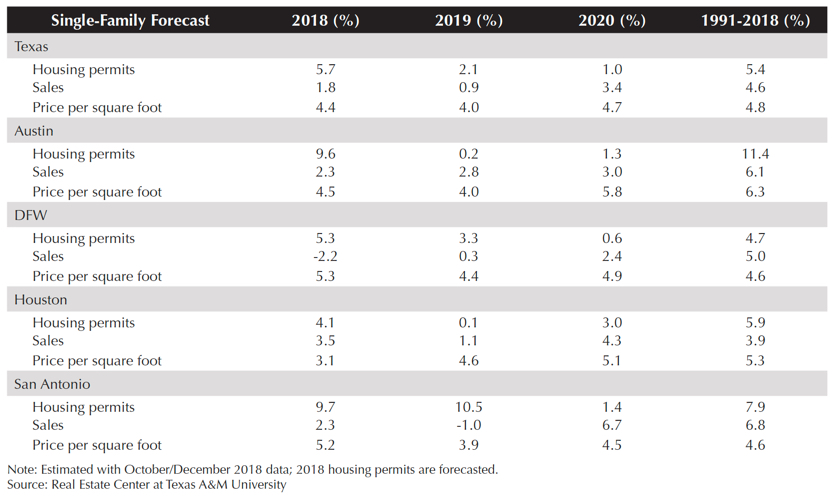2019 Texas Housing & Economic Outlook

You might also like

TG Magazine
Check out the latest issue of our flagship publication.
Helping Texans make the best real estate decisions since 1971.
As the state’s population grows, so does the need for more housing. Here are the data and tools you need to keep up with housing market trends in your area.
Whether you’re talking about DFW’s financial services industry, Austin’s tech sector, Houston’s energy corridor, or the medical hub that is San Antonio, commercial real estate is big business in Texas.
Mineral rights. Water issues. Wildlife management and conservation. Eminent domain. The number of factors driving Texas land markets is as big as the state itself. Here’s information that can help.
Texas is a large, diversified state boasting one of the biggest economies in the world. Our reports and articles help you understand why.
Center research is fueled by accurate, high-quality, up-to-date data acquired from such sources as Texas MLSs, the U.S. Bureau of Labor Statistics, and the U.S. Census Bureau. Data and reports included here are free.
Stay current on the latest happenings around the Center and the state with our news releases, NewsTalk Texas online searchable news database, and more.
We offer a number of educational opportunities throughout the year, including our popular Outlook for Texas Land Markets conference. Check here for updates.
Established in 1971, the Texas Real Estate Research Center is the nation’s largest publicly funded organization devoted to real estate research. Learn more about our history here and meet our team.


The U.S. and Texas economies will continue to expand in 2019 but at noticeably decelerated rates.
Moderate oil prices (around $50 a barrel), softening global economic activity, uncertain international trade negotiations, and volatility in the financial markets will likely cause the Texas and U.S. economies to lose some forward momentum.
Expect U.S. GDP growth to decline to around 2.7 percent in 2019 and about 2.4 percent in 2020 from roughly 3.1 percent in 2018. Texas GDP growth is expected to decline from more than 4.5 percent in 2018 to 4 percent in 2019 and around 3.7 percent in 2020.
Texas employment should grow about 2.7 percent in 2019 compared with 3 percent in 2018. U.S. employment growth should remain roughly the same at around 1.5 percent and slow to 1.3 percent in 2020.

The Texas housing market slowed in 2018 as sales rose 1.7 percent compared with 4.1 the previous year. The shortage of homes priced less than $300,000 combined with rising interest rates weighed on overall activity. Listing inventories inched forward but remained tight relative to demand.
Housing demand showed signs of normalizing, particularly in North Texas, after a multiyear period of record increases. Projected population and job growth, however, suggest healthy demand for the duration of the current economic expansion. The recent pause in sales activity slowed home price appreciation to a historically normal rate. Rising interest rates will hinder housing affordability statewide.
Slowing economic and employment growth along with affordability issues and increasing mortgage interest rates will cause housing sales activity to soften. Price pressures are projected to ease as housing sales weaken and homebuilders stretch to increase production in the entry and first move-up markets.
In 2019, single-family housing sales are projected to increase by only 1 percent after averaging 4.6 percent per year since 1991. Housing permits for new single-family residential units are expected to slow to a 2.1 percent increase from nearly 6 percent in 2018. Lot availability, labor shortages, higher interest rates, and the inability to build homes in the more affordable price ranges will constrain new-home construction.

We expect to see these land market storylines in Texas in 2019.
Receive our economic and housing reports and newsletters for free.
As the state’s population grows, so does the need for more housing. Here are the data and tools you need to keep up with housing market trends in your area.
Whether you’re talking about DFW’s financial services industry, Austin’s tech sector, Houston’s energy corridor, or the medical hub that is San Antonio, commercial real estate is big business in Texas.
Mineral rights. Water issues. Wildlife management and conservation. Eminent domain. The number of factors driving Texas land markets is as big as the state itself. Here’s information that can help.
Texas is a large, diversified state boasting one of the biggest economies in the world. Our reports and articles help you understand why.
Center research is fueled by accurate, high-quality, up-to-date data acquired from such sources as Texas MLSs, the U.S. Bureau of Labor Statistics, and the U.S. Census Bureau. Data and reports included here are free.
Stay current on the latest happenings around the Center and the state with our news releases, NewsTalk Texas online searchable news database, and more.
We offer a number of educational opportunities throughout the year, including our popular Outlook for Texas Land Markets conference. Check here for updates.
Established in 1971, the Texas Real Estate Research Center is the nation’s largest publicly funded organization devoted to real estate research. Learn more about our history here and meet our team.
Helping Texans make the best real estate decisions since 1971.
You are now being directed to an external page. Please note that we are not responsible for the content or security of the linked website.